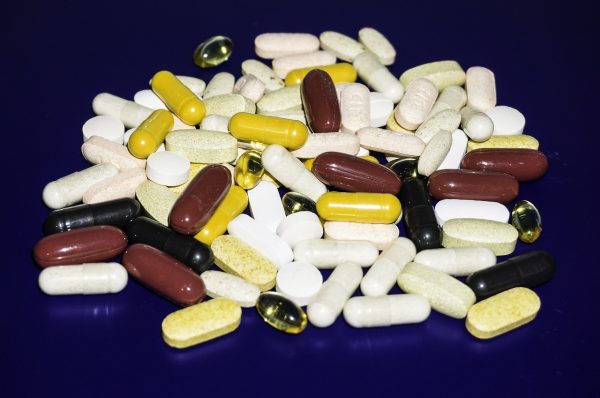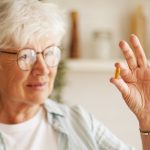Everyone “gets” the idea of taking a multi-vitamin, minerals and many other supplements to help offset nutritional deficits.
But what about CoQ10?
CoQ10 is one of those nutrients everyone over the age of 40 needs more of. It’s also one that’s least understood by most folks.
It’s not a vitamin. It’s not a mineral. So what is it and why do you need it?
Well, it might just be the most important enzyme in your body. And while the need to supplement with it may not be quite as obvious as taking a multi-vitamin, it’s just as crucial. Maybe even more so.
That’s because your CoQ10 levels peak when you’re about 20. And by the time you hit your 40’s or 50’s, your stores of CoQ10 could be running low enough to be a factor in chronic diseases involving highly metabolic tissue, where cellular energy production is critical.
Now, I know a lot people associate CoQ10 with heart health, but that’s not the only area where it shines.
In addition to heart disease, CoQ10 deficiencies have been found in people with kidney disease, cancer, diabetes, Parkinson’s and other neurodegenerative diseases. Deficiency is also linked to dementia, immune system conditions, gum disease… even tinnitus.
CoQ10 Supports Your Heart, Kidneys and Much, Much More!
More than 15% of U.S. adults have kidney disease; and nine out of 10 don’t even know they have it. But it’s much more common in adults 65 and older. It affects nearly 40% of the 65-plus population.
However, research shows that CoQ10 supplementation may improve renal function and reduce the need for dialysis in patients with chronic kidney disease.
I’ve seen this type of improvement myself. At one point, we had a man with chronic kidney disease in the hospital. We wanted to rescue his kidney before resorting to dialysis. So we used intravenous CoQ10, and it brought his kidney function back.
But in many cases, just supplementing with CoQ10 can prevent or reduce the need for dialysis. For instance, in one study, 97 patients with chronic kidney disease took 100 mg of CoQ10 or a placebo for three months. In the CoQ10 group, there were not only marked improvements in markers of renal function, but the number of patients requiring dialysis decreased from 21 to 12.
And in older adults between the ages of 70 and 88, taking a daily dose of CoQ10 (200 mg) with selenium (200 mcg) can help maintain and improve renal function as they continue to age.
So in addition to protecting your heart, CoQ10 protects your kidneys… and so much more!
Probably the most important job CoQ10 has is to power up your mitochondria. These are the energy factories in your cells that produce ATP (adenosine triphosphate) – which your kidneys require a lot of. It’s also the primary energy source for your heart, muscles, liver and other organs.
A decline in mitochondria function as you age contributes to the aging process – not only health wise, but also in appearance. However, CoQ10 helps clean up all of the damaged mitochondria, misfolded proteins and other waste products that damage your cells and contribute to aging.
With all of this in mind, I have yet to meet anyone over the age of 40 who wouldn’t benefit from adding more CoQ10 to their cells. The trick is making sure you get the right amount, in the right form.
The Secret to Choosing the Best CoQ10 for You
The amount of CoQ10 you get from food is minimal. You simply can’t get enough to sustain optimal levels.
But if you are buying regular CoQ10 supplements, you may not be getting the health benefits you’re looking for. That’s because your body has to reduce it down to a useable form.
This is actually a big problem, because not only does your body produce less CoQ10 as you age… it also loses its previous ability to convert it to the reduced form. So your body has a hard time absorbing most CoQ10 supplements.
That’s why I recommend supplementing with the most biologically active form of CoQ10.
It’s called ubiquinol. It’s already reduced, so it’s significantly more absorbable. In fact, your cells absorb up to eight times more CoQ10 from the ubiquinol form than when you take an ordinary CoQ10 supplement.
Taking just 100 mg of ubiquinol each day can make a big difference in your health, longevity, energy levels – and the function of every single cell in your body.
SOURCES:
Kidney Disease Statistics for the United States. National Institute on Diabetes and Digestive and Kidney Diseases. Last Reviewed May 2023.
Mantle D, Hargreaves I. Coenzyme Q10 and Degenerative Disorders Affecting Longevity: An Overview. Antioxidants (Basel). 2019 Feb 16;8(2):44.
Alehagen U, Aaseth J, Alexander J, Brismar K, Larsson A. Selenium and Coenzyme Q10 Supplementation Improves Renal Function in Elderly Deficient in Selenium: Observational Results and Results from a Subgroup Analysis of a Prospective Randomised Double-Blind Placebo-Controlled Trial. Nutrients. 2020 Dec 9;12(12):3780.
Barcelos IP, Haas RH. CoQ10 and Aging. Biology (Basel). 2019 May 11;8(2):28.
Sood B, Keenaghan M. Coenzyme Q10. In: StatPearls [Internet]. Treasure Island (FL): StatPearls Publishing; [Updated 2022 Jan 19].
Hosoe K. Study on safety and bioavailability of ubiquinol (Kaneka QH) after single and 4-week multiple oral administration to healthy volunteers. Regulatory Toxicology & Pharmacology. 2007;47:19-28.
Evans M. A randomized, double-blind, crossover trial comparing the bioavailability of two CoQ10 formulations. Journal of Functional Foods. 2009; I:65-73.



